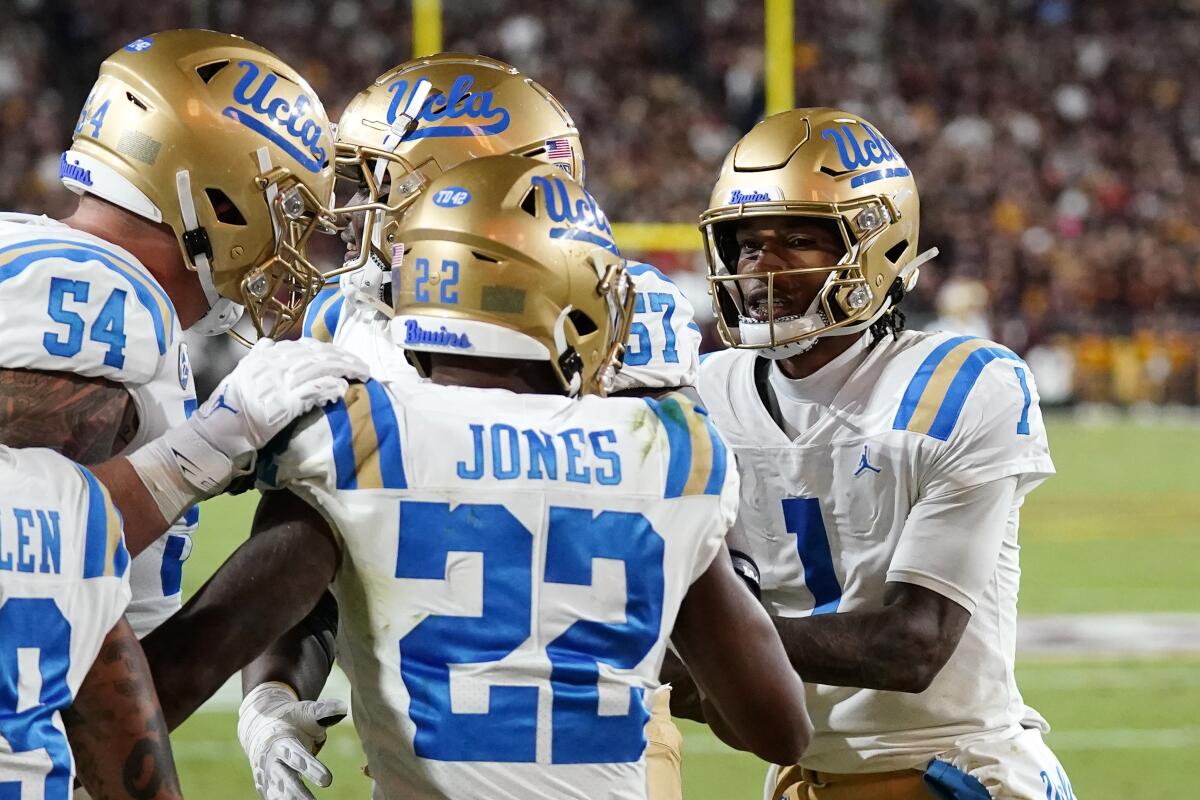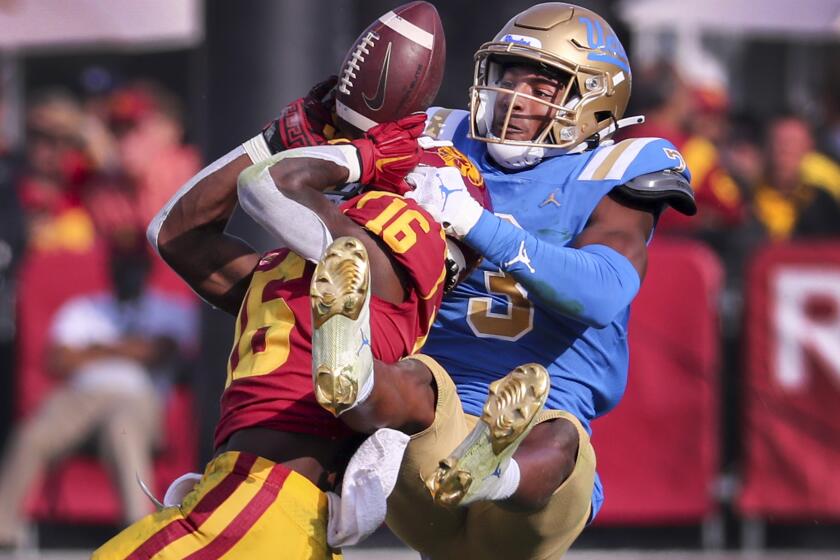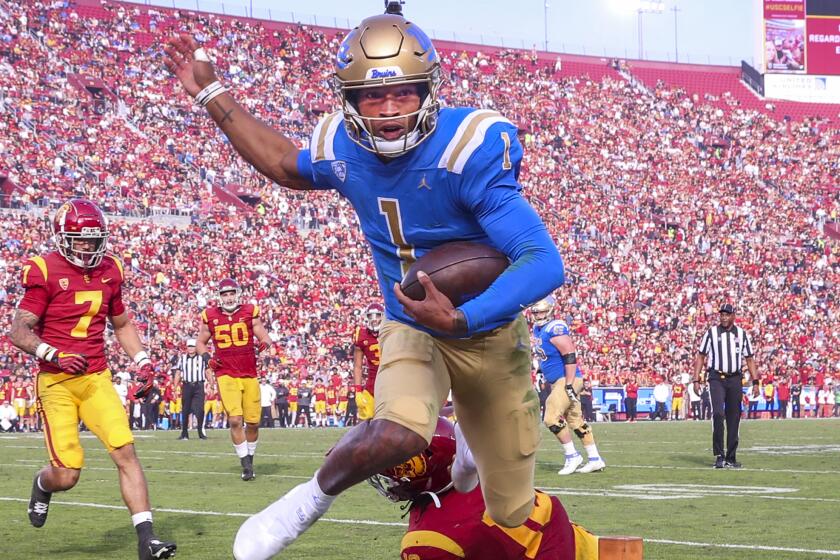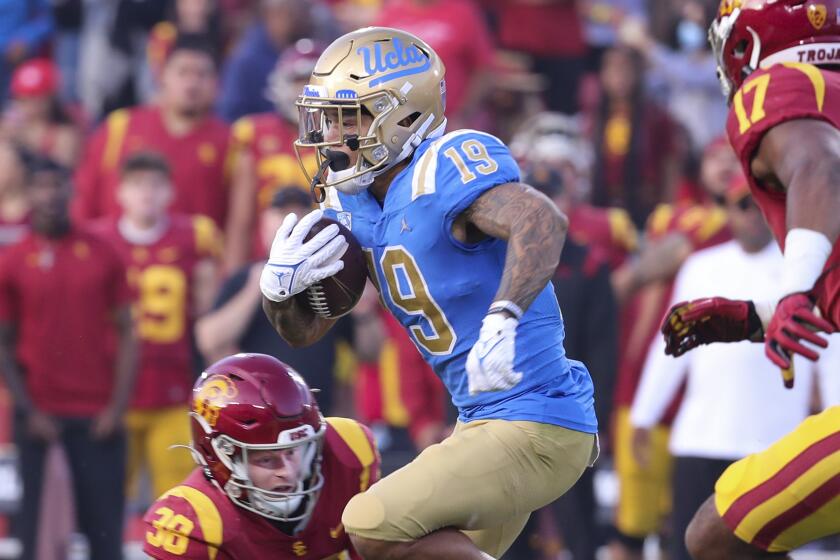UCLA athletes say they value being in same conference as USC as UC regents mull vote

- Share via
As it tries to finalize a move to the Big Ten Conference, UCLA has developed a strong preference for its most despised rival.
According to a survey of Bruins athletes, 93% said it was important or very important to keep UCLA in the same conference as USC, the nemesis it will face Saturday at a sold-out Rose Bowl for a likely spot in the Pac-12 championship football game. Only 24% of Bruins athletes said keeping UCLA and sister school California in the same conference met the same level of importance.
In what might go down as one of the most monumental days in the history of UCLA athletics, the UC Regents could declare their intentions Thursday during a meeting at UC San Francisco’s Mission Bay campus. The agenda for that day has been revised to add an action item that would allow the regents to intervene or withdraw any objections to UCLA’s Big Ten move in the event there is a consensus during the open session.
University of California system leaders proposed new rules that may limit campuses from making major athletics contract decisions on their own.
Clarity on the move is critical for UCLA’s athletic department with football signing day next month and logistics issues needing to be sorted out well in advance of the Bruins’ potentially playing their first games as members of the Big Ten. UCLA Chancellor Gene Block and athletic director Martin Jarmond are expected to attend the meeting.
Among the issues that will be discussed by the regents are additional financial expenditures that UCLA has committed to providing for its athletes because of the increased travel associated with a coast-to-coast conference, as well as the results of a joint survey of 111 Bruins athletes conducted by UCLA and the University of California Office of the President.
UCLA officials believe the roughly eight-figure outlay for enhanced nutrition, travel, academic support and mental health services will be more than offset by additional revenue that comes from joining the Big Ten.
The school is projected to make between $65 million and $75 million in media rights revenue alone during its first year of conference membership, with additional income flowing in from College Football Playoff and NCAA tournament distributions that would likely dwarf what the Bruins would make by remaining in the Pac-12. That should more than double the $34.3 million UCLA made from its Pac-12 media rights and conference distributions in the fiscal year 2020, the last year for which figures are available before COVID-19 walloped athletic department finances across the country.
USC and UCLA are leaving the Pac-12 for the Big Ten Conference in 2024, the two schools announced Thursday.
The conference switch also would prevent UCLA from eliminating Olympic sports teams, something the school said was a possibility given its $102.8-million athletic department deficit. UCLA told the regents that by cutting six teams and eliminating scholarships for eight other sports, it could save about $11 million.
The survey showed there is no overwhelming opposition to the move, as suggested recently by Pac-12 Commissioner George Kliavkoff. Asked about their school going to the Big Ten, 35% of the survey respondents said it would be a good idea, 20% said they had no opinion, 38% said they would need more information and 7% said it would be a bad idea.
When it came to their concerns regarding the move, with multiple answers allowed, 77% identified increased travel times, 66% said increased class time, 48% said travel and competition in colder weather, 43% said the impact on mental health and 38% said the impact on physical health.
As for the benefits of the move, 77% said increased national exposure, 69% said increased resources, 59% said increased TV opportunities, 56% said greater NIL opportunities, 53% said enhanced services to student-athletes, 43% said compete at the highest level, 30% said increased attendance at all games and 28% said maintain the USC rivalry.
The Big Ten’s new TV agreement with Fox, CBS and NBC is worth nearly $8 billion. It will liberate USC and UCLA from after-dark kickoffs.
The biggest expenditure related to conference realignment would involve increased travel costs. UCLA estimated that it would have to pay an extra $4.62 million to $5.79 million for additional charter flights, though that figure could be “significantly reduced” through scheduling accommodations such as neutral-site games and shared flights for UCLA and USC teams.
UCLA also has allocated $2.927 million to enhance nutritional support, providing breakfast and lunch on weekdays for all teams while expanding snack options throughout the day and adding two dieticians and 10 part-time student workers to staff a snack station.
Additionally, the school would pay $1.036 million to double the number of learning specialists from three to six, increase full-time “academic excellence” staff to 22 and expand its summer bridge program from 30 to 100 students, allowing half of all new athletes to enroll in summer school while adjusting to their curriculum. UCLA would also provide a $500 stipend to all athletes to purchase Wi-Fi, hot spots, headphones and other accessories related to remote learning.
Finally, UCLA would provide $562,800 for two new licensed therapists to join the staff of 3.5 mental health service providers, reducing wait times for appointments and providing enhanced care, while also allocating $252,000 for education, preventive measures and direct psychiatric care to help with sleep, eating disorders, substance abuse and other acute conditions.
The regents have conceded that UCLA rightfully used its delegated authority to agree to join the Big Ten while also maintaining that they preserve the authority to overturn the decision. Primary sticking points have included possible adverse effects on UCLA students’ physical and mental well-being resulting from increased travel in addition to the huge financial hit that sister school Cal would take while being left behind in a diminished Pac-12.
But the regents must also weigh the contractual and legal fallout that would come with any intervention. Blocking UCLA’s move to the Big Ten would open them up to massive lawsuits from the Big Ten as well as television partners who have agreed to lavish billions of dollars upon the conference with the expectation of showing UCLA games. It would also potentially result in chaos for UC business partners who might worry that any deals not pre-approved by the regents were subject to being revoked.
More to Read
Go beyond the scoreboard
Get the latest on L.A.'s teams in the daily Sports Report newsletter.
You may occasionally receive promotional content from the Los Angeles Times.










